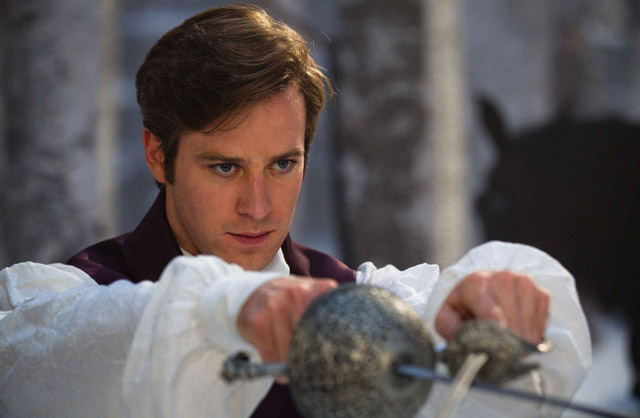 Rating: 3.0/5.0 |
CHICAGO– Since I know I’m the fairest of them all, I won’t focus on the symbolic impressions of ‘Mirror Mirror.’ This is the Snow White legend based on the original story by the Brothers Grimm, and includes Julia Roberts, Lily Collins, Armie Hammer and Nathan Lane in its cast.
It was a lovingly delivered film, full of fairy tale production design, amusing asides by Nathan Lane, a princely performance by Armie Hammer and America’s-Sweetheart-Gone-Bad Julia Roberts. What it lacked in that delivery was a spark of energy, and preferred launching easy gags instead of going darker. It’s not that the film is disappointing, it’s just that by the end there is a feeling of something missing, or a wish that the whole film could have been as good as its sporadic best moments.
Th film is not the Disney Snow White familiarity, it is based on the grittier multi-layered story by Jacob and Wilheim Grimm. In a kingdom far far away is a happy land where the King (Sean Bean) dotes on his only daughter, Snow White (Lily Collins), especially since her mother has passed away. But he does eventually remarry and Queen Clementianna (Julia Roberts) ascends to the throne. When the king mysteriously disappears, the castle is left to a now 18 year-old Snow White, the evil queen and a sycophantic attendant named Brighton (Nathan Lane). The once happy kingdom falls to misery.
 Photo credit: Jan Thijs for Relativity Media |
The queen has her famous mirror, and middle age is threatening her “fairest in the land” title. Meanwhile, Snow White is venturing outside the castle walls for the first time, and meets the errant Prince Alcott (Armie Hammer), who has been robbed by seven small men. Snow takes him back to the castle, and there the queen decides to marry him. But the prince’s ardor focuses only on Snow White, so the jealous queen banishes the girl to the cold forest. The seven “dwarfs” adopt her, and prepares her to battle for her love, the throne and the kingdom.
The film is visually arresting, both in production design and costuming. Director Tarsem Singh brought last year’s mythological “Immortals” to the screen in a similar fashion, and here he imagines the scenic splendor of the fairy tale. The set pieces – like the magnificent castle, the wintry forest and the dwarf’s home in a hollow tree – have a quality like the elaborate illustrations in a story time book. The costuming, especially of the royals, have the perfect let-them-eat-cake overindulgence and adds to the separation between the castle dwellers and the peasants.
The performances are hit and miss. The two main characters, the queen and Snow White, take awhile to find their traction. Julia Roberts can’t get appropriately evil enough, and plays the antagonist like a petulant, sarcastic child. Lily Collins, probably best known as the daughter in “The Blind Side,” low keys the Snow role, but does get more into it after her battle training by the dwarves. The conflict of their good-versus-evil subsequently takes too much time to get heated up, and the first half of the film drags.
Armie Hammer (“The Social Network”) has fun with the character of the prince, especially after he is put under a spell that has him acting in an unseemly matter. Nathan Lane is the perfect butt-kissing foil for the queen, and has a lot of the better laugh lines as if playing a comic greek chorus. Surprising casting, likes 1980s favorite Mare Winningham (Baker Margaret) and character actor Michael Lerner (the Baron) adds some spice to the mix.
 Photo credit: Jan Thijs for Relativity Media |
The film permeates its narrative with a sly humor, and it adds some electricity into the traditional proceedings. The dwarves are almost comic relief when they show up, and besides battle preparation they provide background commentary on the adventures of Snow. The original fairy tale is actually quite dark, with its black magic, the womanhood of Snow White and the arch egotism of the evil queen. Although welcome, the humor broke up the potential for something deeper.
The second half of the film quickens the pace and the action of the story, but there is nothing really exciting under this happily-ever-after sun. It’s almost like the whole film is defined by the old Mae West quip, “I was Snow White, but I drifted.”
 | By PATRICK McDONALD |